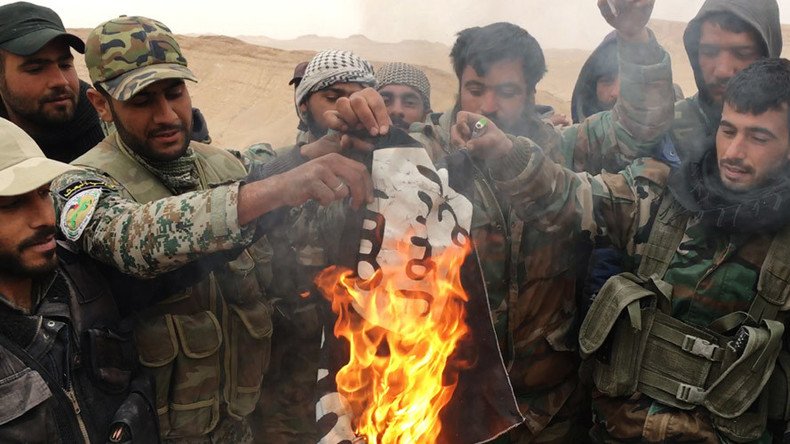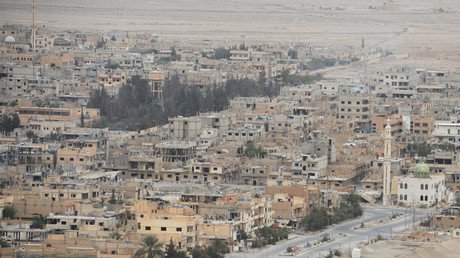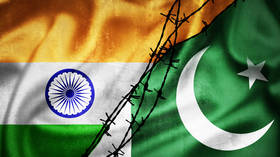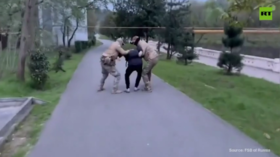‘For ISIS to survive, it needs support from allies: Turkey, Qatar, Saudi Arabia and the US’

Reports that Syrian government forces have retaken the city of Palmyra from ISIS forces prove that the terrorist group is incapable of withstanding a conventional assault, Gregory R Copley, strategic analyst and editor of Defense & Foreign Affairs told RT.
A commander of the Desert Falcons unit of the Syrian army told RT that the "military operation to retake Palmyra lasted three days," adding that the "main difficulty was that there were a lot of mines along the roads."
Before news of the retaking of Palmyra had been confirmed, Copley told RT that the Syrian Army’s successes in the ancient city, which fell under control of ISIS last year, demonstrates that it is able “to move in a conventional, combined operations attack against a conventional target.”
He compared those military capabilities to that of ISIS forces, which he said “are not really able to withstand a conventional assault against a major organized air-ground operation by a force such as the Syrians, supported by Russian and Syrian airpower.”
The Russian military on September 30, 2015 opened a fierce aerial assault against ISIS positions in Syria, hitting command and control centers and oil facilities with equal ferocity, following an official request by the Syrian government for military assistance against the jihadist group.
On March 14, President Putin, saying the objectives in Syria had been successfully reached, ordered the withdrawal of the "main part" of the Russian forces from Syria.
Speaking on the possible defeat of ISIS by Syria’s conventional forces, Copley called such a scenario “very significant” in that it not only demonstrates that “the Syrian Armed Forces – supported by the Russians – are back in business,” it also sends an unmistakable message to Ankara that “now it’s going to be serious if Turkey tries its own intervention into Syria or Iraqi territory.”
The recapture of Palmyra is significant both symbolically and strategically. This is a 2,000-year-old city at the heart of many civilizations in the Levant. The destruction of it was done to great fanfare as we watched ISIS march in to Palmyra with no accompanying US airstrikes to thwart it... It is also symbolic because the ground forces that fought against ISIS in Palmyra were all Syrian. - Sharmine Narwani, political analyst on Middle East affairs, to RT
The strategic analyst then said a mouthful when he predicted that in order for ‘Daesh’ [a term for Islamic State that is considered derogatory] to “survive” it will need “a lot of support from its allies.” Copley went on to list those allied countries as “Turkey, Qatar, Saudi Arabia and the US.”
However, with respect to the United States reportedly offering assistance to the group, Copley admitted, without elaborating, that some people in the United States are beginning to have “second thoughts” about the idea.
Finally, with the world still shaken from the fresh terrorist attacks in Brussels, which left over 30 people dead and scores injured, Copley’s next statement resonated with the prospects of future atrocities, assisted, it would seem, by a NATO member: “I think we’ll start to see Daesh react to this, again with help from Turkey’s MIT [Turkish Intelligence Organization] by going into stronger operations into Europe and into Libya.”
He emphasized, however, that Islamic State is on the defensive, not just in Syria, but in Libya as well. But apparently being weakened will only make the group more dangerous and unpredictable.
Since the Russians and Syrians... began dealing with this issue, we see success after success. It shows the international community that there has to be an effective, local coalition... and sooner or later we hope to see the end of Islamic State in the region altogether. - Massoud Shadjareh, Chair of the Islamic Human Rights Commission, to RT
“[Islamic State] forces are starting to come against real opposition from the Libyan military and from movements around the tribes, which are coalescing towards getting the monarchy back into play to galvanize the country against Daesh. So basically Daesh is now on the defensive; it’s going to require a lot more support from Turkey if it’s to succeed.”
Copley concluded with the rather disturbing observation that the Turkish government of President Recep Tayyip Erdogan “cannot afford to let Daesh fail at this stage because if it does then the war gets carried back into Turkey and the civil war which it is now waging against the Kurds will expand terrifically.”
The statements, views and opinions expressed in this column are solely those of the author and do not necessarily represent those of RT.














